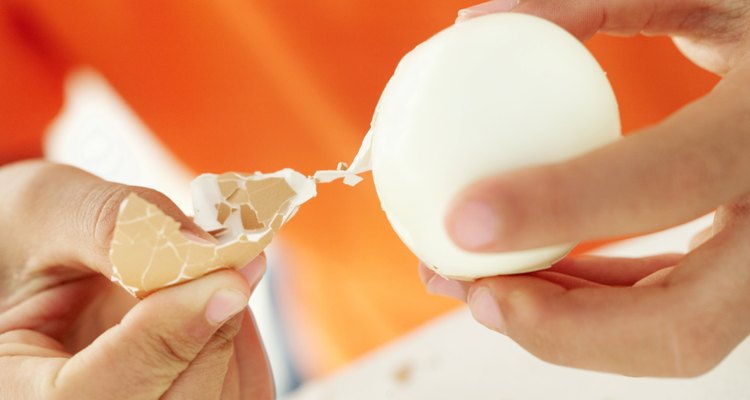
Stockbyte/Stockbyte/Getty Images
Despite the common belief that piercing eggs before boiling prevents the shells from cracking and makes the peeling process speedier, the American Egg Board continues to emphasize the dangers associated with doing so. Whether it is done with a pin, needle, thumbtack or other sharp object, piercing eggs prior to boiling is not a recommended practice. If you pierce, poke or prick your eggs before cooking, consider alternatives to marring the shells.
Cracking Misconceptions
After you boil a pierced egg, a quick glance can lead you to believe that there are no visible cracks in the shell. But, a closer look soon reveals tiny, hairline cracks that you may not expect. The eggshell provides a layer of protection, surrounding the contents of the egg from dangerous bacteria. Once the egg cracks, this protection is compromised and bacteria is free to enter. Consuming a pierced egg containing bacteria may make you seriously ill.
Bacteria Dangers
Salmonella Enteritidis, the bacteria that causes salmonella, is just one of several types of bacteria naturally found on eggshells. As these bacteria grow and multiply, they penetrate weak spots in the egg. Even if bacteria spores fail to enter through the cracks in pierced eggs, the possibility exists that bacteria may enter the egg via the piercing tool itself. Consuming bacteria-laden eggs exposes you to foodborne illnesses that may make you seriously ill.
A Safer Option
Instead of piercing and boiling the eggs, simmer the eggs. Gently place a single layer of eggs in a saucepan, adding water an inch higher than the top of the eggs. Bring the eggs to a strong simmer over medium-high heat, reducing the heat just before boiling. Start your timer and maintain the simmer, 2 minutes for soft-boiled, 4 1/2 minutes for medium-boiled and 8 minutes for hard-boiled. Cool the eggs under cold running water when the timer sounds to stop the cooking process.
An Easier Peel
Piercing allows water to create a separation between the inner membrane and the shell. Some cooks believe that this gap tends to make peeling a boiled egg easier. Knowing that the practice of piercing eggs can make you sick, peel the eggs immediately after cooling. Rolling the eggs on the counter before plunging them into the cold water also works to make peeling easier. You may also want to save older eggs -- not expired eggs – for boiling and the freshest eggs for other types of cooking, since the inner membrane clings more tightly to the shells of fresh eggs.
Related Articles

How to Cook a Hard Boiled Egg With a ...
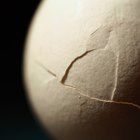
Can You Hard Boil a Broken Egg?

Shelf Life of Hard Boiled Eggs

What Causes an Eggshell to Stick to a ...
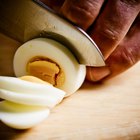
Can You Eat Hard-Boiled Eggs Even ...
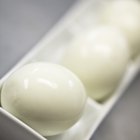
How to Make Salted Egg

Can You Eat an Egg That's Been Frozen?

How to Freeze Raw Eggs
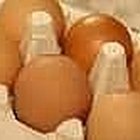
How to Make Your Deviled Eggs Look Great

How Can I Tell If an Egg Is Hard-Boiled ...

What Happens When an Egg Cracks While ...

How to Preserve a Hard Boiled Egg

How Are Egg Sizes Determined?

How to Prevent Dark Circles in Hard ...

How to Cook Eggs Sunny Side Up Without ...

How to Cook Eggs in Cupcake Pans
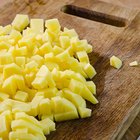
How to Boil Cubed Potatoes to Pan Fry ...
How Much Does it Cost to Freeze Your ...
How Long After I Cook Hard-Boiled Eggs ...
How to Make an Overeasy Egg
References
Writer Bio
Jonae Fredericks started writing in 2007. She also has a background as a licensed cosmetologist and certified skin-care specialist. Jonae Fredericks is a certified paraeducator, presently working in the public education system.
Photo Credits
Stockbyte/Stockbyte/Getty Images